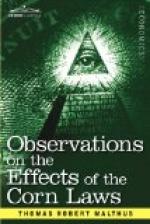It was a fatal mistake in the system of the Economists to consider merely production and reproduction, and not the provision for an increasing population, to which their territorial tax would have raised the most formidable obstacles.
On the whole then considering the present accumulation of manufacturing population in this country, compared with any other in Europe, the expenses attending enclosures, the price of labour and the weight of taxes, few things seem less probable, than that Great Britain should naturally grow an independent supply of corn; and nothing can be more certain, than that if the prices of wheat in Great Britain were reduced by free importation nearly to a level with those of America and the continent, and if our manufacturing prosperity were to continue increasing, it would incontestably answer to us to support a part of our present population on foreign corn, and nearly the whole probably of the increasing population, which we may naturally expect to take place in the course of the next twenty or twenty five years.
The next question for consideration is, whether an independent supply, if it do not come naturally, is an object really desirable and one which justifies the interference of the legislature.
The general principles of political economy teach us to buy all our commodities where we can have them the cheapest; and perhaps there is no general rule in the whole compass of the science to which fewer justifiable exceptions can be found in practice. In the simple view of present wealth, population, and power, three of the most natural and just objects of national ambition, I can hardly imagine an exception; as it is only by a strict adherence to this rule that the capital of a country can ever be made to yield its greatest amount of produce.
It is justly stated by Dr Smith that by means of trade and manufactures a country may enjoy a much greater quantity of subsistence, and consequently may have a much greater population, than what its own lands could afford. If Holland, Venice, and Hamburg had declined a dependence upon foreign countries for their support, they would always have remained perfectly inconsiderable states, and never could have risen to that pitch of wealth, power, and population, which distinguished the meridian of their career.
Although the price of corn affects but slowly the price of labour, and never regulates it wholly, yet it has unquestionably a powerful influence upon it. A most perfect freedom of intercourse between different nations in the article of corn, greatly contributes to an equalization of prices and a level in the value of the precious metals. And it must be allowed that a country which possesses any peculiar facilities for successful exertion in manufacturing industry, can never make a full and complete use of its advantages; unless the price of its labour and other commodities be reduced to that level compared with other countries, which results from the most perfect freedom of the corn trade.




